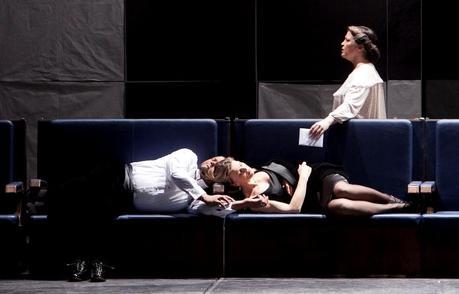
Letters in the night: Eugene Onegin Act III. Photo © Staatstheater Mainz
Some nineteenth-century critics commented acerbically that Tchaikovsky's adaptation of Pushkin's masterpiece into "lyric scenes" ought not to be called Eugene Onegin at all, but rather Tatiana. Mainz's current run of the piece (trailer here), which I attended on Friday, reminded of the strengths of this position. Johannes Erath's production, stylized and faintly surrealist, offered a meditation on the tragedies of transience (I was unsurprised to find Marcel Proust quoted in the program.) The orchestra, alas, began without distinction and deteriorated from there. The cast boasted some strong characterizations, and some fine singing; the most consistently compelling in both, in my view, was the young soprano Tatjana Charalgina, embodying her namesake.Pushkin wrote about the sensibilities of a world on the point of vanishing, and Johannes Erath chose a moment of societal transition for his production, as well. The costumes of Noëlle Blancpain suggested the self-conscious modernity and self-conscious nostalgia of the early 1960s, and were also used cleverly in characterization (Olga gets neon colors, Tatiana a pillbox hat, Onegin a white dinner jacket, Lensky a Walther PPK.) Generally, the production seemed much more attentive to the text than to the music. The Nurse, who panics about having forgotten what she once knew, is the anguished guardian of gentle traditions, clinging to a silver samovar in the rapidly rattling train where the first scenes are set. Photographic backdrops suggest the inability of the travelers to linger in the landscapes so lushly described by Pushkin. Even the train compartments gradually separate, pulling people together and apart. Assuming increasing centrality during the letter scene is a photo booth: that curious mechanism meant to enshrine moments trivial almost by definition. While the surrealist touches of the production could be claustrophobic or playful, the society portrayed was essentially (and oppressively) ordered, gradually forcing the conformity of all the principals.
Florian Csizmadia led the orchestra in the 1880 edition of the score, without Act III ecossaises and with a number of brisker tempo markings than the usually-performed version. The performance as a whole, though, was so sadly lacking in coherence that I didn't feel these changes made much difference to the orchestral contribution. The clarinet solos, it's true, were lovely, but crude brass and out-of-tune strings were both conspicuous in a rendition conspicuous for its lack of shape. Let us pass on. Prince Gremin--a youthful Prince Gremin, as in Pushkin--was well-characterized and strongly sung by José Gallisa. Another standout was Katherine Marriott as the Nurse, with a rich, steady mezzo and a sensitive, haunting characterization of a woman unable either to find security or impart wisdom in a world which has never been kind to her. Sanja Anastasia made a competently sung and credibly flirtatious Olga. The Madame Larina of Patricia Roach was poignantly characterized as a woman who has learned how to use society's rules to her advantage, even if she doesn't fully realize what it has cost her. Although the Lensky of Thorsten Büttner seemed to struggle with phrasing, he had a very sweet timbre and sang and acted with suitably self-conscious ardor.
Tatjana Charalgina conveyed with secure musicianship and dramatic immediacy the passionate nature of the piece's heroine. She has a solid, clear soprano, lyric rather than dramatic, but of impressive power. That she was overpowered at the very bottom of her range I think can be attributed mostly to the orchestra. Charalgina used phrasing and vocal coloring expressively, but still more impressive the emotional intensity of her singing. As her Onegin, Heikki Kilpeläinen sang with elegance and lyricism. His timbre was both rich and rich in facets, and his was a creditable performance. Apparent inconsistencies in Onegin's characterization might have been partly due to the production; partly, no doubt, to the mysteriously elusive nature of Tchaikovsky's protagonist, a man who, desperately fighting for his own individuality, fails utterly to recognize the humanity of those around him.

